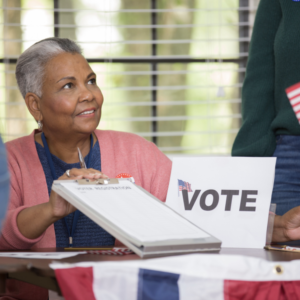
Traditionally less publicized, state and local elections often see turnout rates much lower and less representative of a given community when compared to midterm and presidential elections. However, this is not to say these elections are any less important. From city councils to school boards, local elections directly affect all aspects of our daily lives and are responsible for deciding how our local community will tackle key issues such as housing, transportation, health, and public safety.
It is for these reasons that we as nonprofits must actively work this local election year to mobilize voters and distill the importance of being a local voter. By engaging in nonpartisan voter engagement we can utilize our position as trusted messengers in our communities and reach underserved populations that campaigns and candidates often miss.
As a 501(c)(3), it is perfectly acceptable (and legal) for your organization to promote voter engagement and discuss elections, however, you MUST only do so on a nonpartisan basis. If your organization is looking for guidance on what you can (and can’t) say when talking to voters you’re in the right place! We have put together a series of frequently asked questions to help guide your organization on how to remain nonpartisan while engaging staff, clients, and community members in elections.
What is OK to talk about on a nonpartisan basis?
A great place to begin would be to inform your service users about the voting process. This could include promoting key voter registration dates and deadlines, how to request a mail ballot, early voting opportunities, and where to vote.
Have a state or local race coming up in the next few months? Now is the perfect time to start uplifting relevant information about the election, and in doing so, help ensure the community you serve is #VoteReady. Be sure to check your state’s chief election division (usually the Secretary of State’s office) or county elections office for accurate information.
What should I do if a voter asks who I support or who they should vote for in a local race?
As trusted members of the community, it is possible voters may look to your nonprofit for guidance when talking about upcoming elections. If they ask you who you are supporting or who they should vote for, you should remind them that as a nonprofit employee you must remain nonpartisan. Instead, you may:
- Encourage that person to talk to a friend or family member they trust and share values with
- Direct the person to a sample ballot or nonpartisan voter guide if available
- Point them to online tools that let voters know what’s on their ballot. Resources include vote411.org or Nonprofit VOTE’s Voting In Your State: 50 State Guide. Alternatively, you may google “What’s on (my state) ballot?
Is there anything I can say about specific candidates?
When talking to voters about candidates running for a certain seat, you should stick to the facts. This includes which party they are affiliated with, whether they are an incumbent or challenger, and where they live. Remember, under no circumstances should you state your personal preference.
If I am asked about the difference between political parties, what should I say?
You should treat talking about political parties as you would when discussing candidates, and instead encourage the hopeful voters in your community to speak with a friend or go to the political party’s official websites.
What if I’m asked about a ballot measure?
The IRS clearly states that “501(c)(3) organizations may take positions on public policy issues, including issues that divide candidates in an election for public office.” This could include everything from normal lobbying and public education activities to correcting the record when a candidate misrepresents facts related to your issues. Because of this, you may discuss the pros and cons of a ballot measure unless it is your organization’s policy not to.
Can I support candidates in my personal time?
You may support candidates in your personal time, however, while “on the clock” working for your nonprofit you must not express any personal opinions you may have related to any candidate, upcoming election, or its outcome.
Can I use social media to post or share information about the candidates?
If you are posting from your organization’s social media accounts, you must ensure your feed remains nonpartisan. You are free to express your opinions when using your personal accounts, however, nonprofit CEOs or Executive Directors who personify their organization may wish to be more careful.
What about talking to other staff about the elections?
It’s normal to exchange views on an upcoming election with other staff during work breaks. However, you should not conduct political activities during work hours with staff. Such activities could include handing out literature or signing up other staff to support a candidate.
What are some permissible voter engagement activities?
As a 501(c)(3), there are a number of activities your organization can do on a nonpartisan basis to promote voter and civic engagement as part of its charitable and educational mission. Such activities could include: promoting voter registration, educating voters on the voting process, distributing sample ballots or nonpartisan voter guides, and encouraging voters on election day to get out and vote. For a complete list of acceptable activities, see our “Staying Nonpartisan: Permissible Election Activities Checklist” here.




